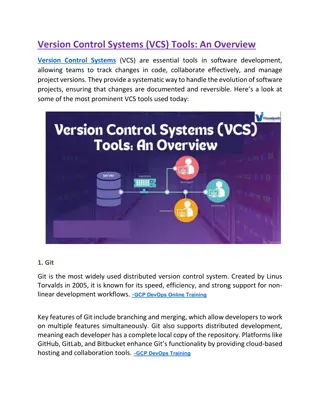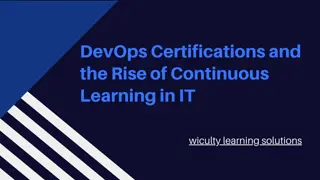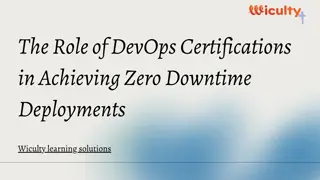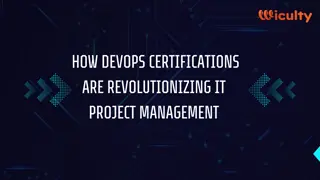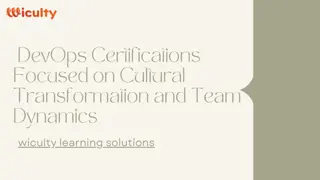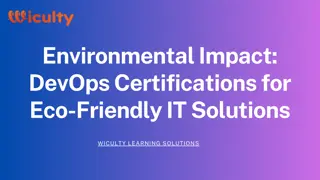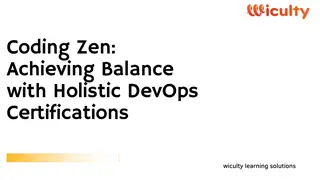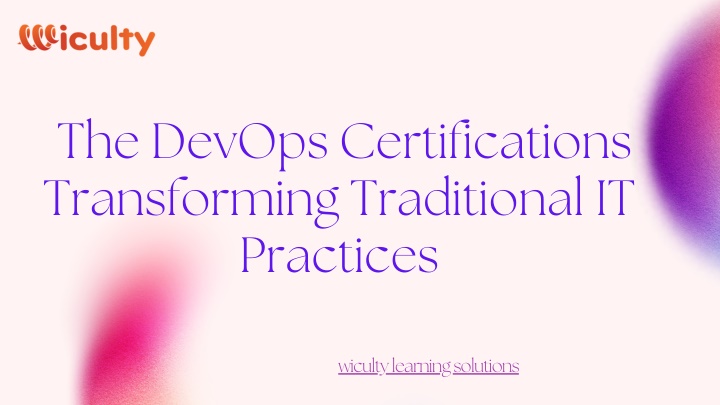
The DevOps Certifications Transforming Traditional IT Practices
As the IT landscape continues to evolve, the importance of DevOps certifications cannot be overstated. These certifications are more than just a testament to a professionalu2019s skillsu2014they are catalysts for transforming traditional IT practic
Download Presentation

Please find below an Image/Link to download the presentation.
The content on the website is provided AS IS for your information and personal use only. It may not be sold, licensed, or shared on other websites without obtaining consent from the author. If you encounter any issues during the download, it is possible that the publisher has removed the file from their server.
You are allowed to download the files provided on this website for personal or commercial use, subject to the condition that they are used lawfully. All files are the property of their respective owners.
The content on the website is provided AS IS for your information and personal use only. It may not be sold, licensed, or shared on other websites without obtaining consent from the author.
E N D
Presentation Transcript
The DevOps Certifications Transforming Traditional IT Practices wiculty learning solutions
The Evolution of DevOps DevOps, a portmanteau of "development" and "operations," represents a cultural and professional movement that advocates for better communication, collaboration, and integration between software developers and IT operations professionals. This approach aims to shorten the systems development life cycle and provide continuous delivery with high software quality. As organizations strive to be more agile and responsive to market demands, DevOps has emerged as a key driver of innovation and efficiency.
The Role of Certifications in DevOps Certifications play a crucial role in formalizing the skills and knowledge required to effectively implement DevOps practices. They validate a professional s expertise and commitment to the principles of DevOps, making them more attractive to employers who are looking to modernize their IT operations. Here are some of the most impactful DevOps certifications that are transforming traditional IT practices: 1. AWS Certified DevOps Engineer Professional Amazon Web Services (AWS) is a leader in cloud computing, and its DevOps Engineer certification is highly regarded. This certification validates technical expertise in provisioning, operating, and managing distributed application systems on the AWS platform. Professionals with this certification are adept at implementing and managing continuous delivery systems and methodologies on AWS, a critical skill as more organizations move to cloud- based infrastructures.
2. Certified Kubernetes Administrator (CKA) Kubernetes has become the de facto standard for container orchestration, and the Certified Kubernetes Administrator certification is essential for those looking to master this powerful tool. This certification covers the skills needed to manage Kubernetes clusters, which are integral to modern DevOps environments. With Kubernetes at the core of many DevOps workflows, this certification helps bridge the gap between development and operations. 3. Google Professional DevOps Engineer Google Cloud s Professional DevOps Engineer certification focuses on efficient development operations that can balance service reliability and delivery speed. It covers topics such as applying site reliability engineering principles to a service, building and implementing CI/CD pipelines, and monitoring and logging systems. This certification is particularly valuable as it aligns with Google s expertise in large-scale infrastructure and performance optimization.
4. Microsoft Certified: DevOps Engineer Expert Microsoft s certification is designed for professionals working with Azure, its cloud platform. It validates the ability to combine people, process, and technologies to continuously deliver valuable products and services that meet end user needs and business objectives. This certification emphasizes collaboration, infrastructure as code, configuration management, and monitoring all critical components of a successful DevOps strategy. 5. DevOps Institute Certifications The DevOps Institute offers several certifications that cater to different aspects of DevOps, including DevOps Foundation, DevSecOps, and Site Reliability Engineering (SRE). These certifications provide a comprehensive understanding of DevOps principles and practices, and are designed to help professionals at various stages of their careers. They emphasize the cultural and organizational changes required to implement DevOps successfully.
Transforming Traditional IT Practices DevOps certifications are not just about acquiring technical skills they are about transforming mindsets and organizational cultures. Here s how these certifications are revolutionizing traditional IT practices: 1. Enhanced Collaboration and Communication DevOps fosters a culture of collaboration between development and operations teams, breaking down silos that have traditionally impeded efficiency and innovation. Certifications ensure that all team members are on the same page regarding best practices and methodologies, facilitating smoother interactions and a more cohesive workflow.
2. Increased Agility and Responsiveness Traditional IT practices often involve lengthy development cycles and rigid processes. DevOps, supported by certified professionals, introduces continuous integration and continuous delivery (CI/CD) pipelines, enabling faster and more reliable software releases. This agility allows organizations to respond more quickly to market changes and customer needs. 3. Improved Quality and Reliability By integrating automated testing, monitoring, and deployment processes, DevOps reduces the likelihood of errors and downtime. Certified DevOps professionals are equipped to implement these automated systems, ensuring that software is thoroughly tested and monitored throughout its lifecycle. This leads to higher quality and more reliable services.
4. Scalability and Flexibility DevOps practices, particularly those involving cloud platforms and containerization, allow organizations to scale their IT operations more effectively. Certifications in platforms like AWS, Azure, and Kubernetes equip professionals with the skills to manage and optimize scalable infrastructures, providing the flexibility needed to support growing business demands. 5. Cost Efficiency By streamlining processes and improving collaboration, DevOps can significantly reduce operational costs. Certified DevOps professionals are trained to identify and eliminate inefficiencies, optimize resource usage, and implement cost-effective solutions, all of which contribute to a more economical IT operation.
Conclusion As the IT landscape continues to evolve, the importance of DevOps certifications cannot be overstated. These certifications are more than just a testament to a professional s skills they are catalysts for transforming traditional IT practices. By fostering a culture of collaboration, enhancing agility, improving quality, and enabling scalability, DevOps certifications are helping organizations navigate the complexities of modern IT environments and drive business success. Whether you re an IT professional looking to advance your career or an organization aiming to stay competitive, investing in DevOps certifications is a strategic move that promises significant returns.
Thanks You wiculty learning solutions






